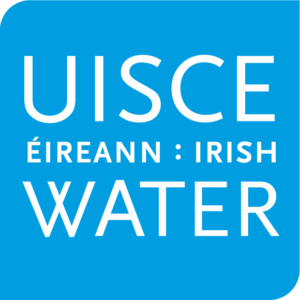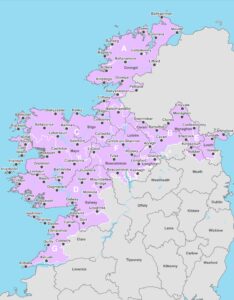Public Consultation runs from 22 November 2022 to 21 February 2023
We want to hear from you!
Meet our team at a public webinar and have your say on our plans to supply water in your area
Irish Water today begins a three-month public consultation on the draft Regional Water Resource Plan – North West (RWRP-NW). The plan sets out options for providing a more secure, reliable and sustainable water supply for 732,700 customers in the North West region over the next 25 years. The plan includes counties Cavan, Donegal, Galway, Leitrim, Mayo, Monaghan, Sligo and parts of Clare, Longford, Louth, Meath and Roscommon. Eight islands off the coast of Ireland are also included in the region.
Irish Water’s National Water Resources Plan will be the first resources plan for the entire public water supply in Ireland. The National Plan will identify the needs across our existing supplies and the challenges and opportunities that we face over the coming years including legislation, climate change, the environment, growth and economic development. The National Plan will allow us to understand the actions and activities required to transform our water supplies and provide a safe, secure, reliable, and sustainable water supply for our current and future customers. The National Plan will also provide a transparent roadmap on how Irish Water will plan for its water assets to align with national policy.
Given the scale of the area to be covered, the National Plan is being rolled out in two phases. The National Plan was first adopted in the summer of 2021 and Irish Water has since moved into Phase 2 and is preparing four Regional Water Resources Plans.
The four regions are:
- Regional Water Resources Plan: North West
- Regional Water Resources Plan: South West
- Regional Water Resources Plan: South East
- Regional Water Resources Plan: Eastern and Midlands
Each Regional Plan is subject to its own consultation and, once adopted, all of the Regional Plans and the Framework Plan will be treated as a unified National Plan.
Public consultation on the draft Regional Water Resources Plan North West launches today and will continue until 21 February 2023.
The draft RWRP-NW describes the North West Region and the current challenges faced now and into the future in terms of delivering a safe, secure and resilient water supply. It identifies progress made to date, for instance through leakage reductions, capital investment works, and works in progress. It applies the methodology as adopted in the Framework Plan to (i) identify the Need across the 119 Water Resource Zones, in terms of quality, quantity, reliability and sustainability of supply, and (ii) identify Plan level solutions to meet this Need across the region.
There are 142 Water Treatment Plants (WTPs) in the North West Region, which collectively serve 732,700 people or 18% of the population of Ireland, via approximately 17,732 kilometres of distribution network and 119 Water Resource Zones. These treatment plants also serve 74,000 businesses. The region itself covers approximately 26,912 square kilometres, encompassing counties Cavan, Donegal, Galway, Leitrim, Mayo, Monaghan, Sligo and parts of Clare, Longford, Louth, Meath and Roscommon. Eight islands off the coast of Ireland are also included in the region.
Speaking at the launch of the public consultation, Mairéad Conlon, Regional Water Resources Strategy Lead for Irish Water said, “The development of a draft plan on how Irish Water will supply water across the North West region is an important step. It will allow Irish Water to review water supply needs across the region and consider local options to resolve these needs.
“The draft Regional Plan will offer key benefits in terms of transformation of our supplies, including the ability to cater for growth and economic development in a sustainable way, through improved interconnectivity between our supplies to ensure balanced regional development and new sustainable water sources that are adaptable to climate change.
“The draft plan sets out how we envisage water will be supplied to homes and businesses across counties Cavan, Donegal, Galway, Leitrim, Mayo, Monaghan, Sligo and parts of Clare, Longford, Louth, Meath and Roscommon over the next 25 years. Eight islands off the coast of Ireland are also included in the region. Our team hopes to meet as many people as possible and hear from them about their local areas, to ensure that our plan is the best fit for the North West region,” explained Mairéad.
Irish Water is now seeking feedback on the public consultation for the draft RWRP-NW and associated SEA Environmental Report and Natura Impact Statement (NIS). The documents are available to view on our website at www.water.ie/rwrp/north-west.
A 12-week statutory public consultation will run from 22 November 2022 to 21 February 2023.
Submissions can be made by post or email by 21 February 2023 to:
Email: nwrp@water.ie
Post: National Water Resources Plan, Irish Water, PO Box 13216, Glenageary, Co. Dublin
This public consultation is everyone’s opportunity to feed into the process of how Irish Water identifies the water supply issues in the region and determines what the options are to provide a more resilient water supply to customers within the region.
Public webinars will be facilitated in January and February 2023. These webinars will provide information on the draft Regional Water Resources Plan – North West and allow opportunities to pose questions to our team. If you would like to be part of an online public webinar on the draft Regional Water Resources Plan – North West and associated environmental reports, you can register your interest on our website at www.water.ie/rwrp/north-west.
Irish Water is also seeking feedback on how it will develop options to address any problems identified.
All submissions will be taken into consideration and responses to the issues raised will be summarised in a Consultation Report, which will be published on www.water.ie/nwrp.






